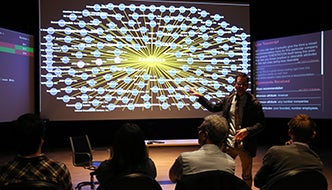 Rensselaer hosted the fifth annual Conference on Advances in Cognitive Systems May 12-14, featuring presentations from researchers at organizations including Naval Research Lab, MIT, Google, Georgia Tech, and IBM. On May 11, the Cognitive and Immersive Systems Laboratory (CISL) at Rensselaer hosted a related workshop on cognitive and immersive systems, including a demonstration of the “situations room” the lab is developing as part of an ongoing collaboration between Rensselaer and IBM.
Rensselaer hosted the fifth annual Conference on Advances in Cognitive Systems May 12-14, featuring presentations from researchers at organizations including Naval Research Lab, MIT, Google, Georgia Tech, and IBM. On May 11, the Cognitive and Immersive Systems Laboratory (CISL) at Rensselaer hosted a related workshop on cognitive and immersive systems, including a demonstration of the “situations room” the lab is developing as part of an ongoing collaboration between Rensselaer and IBM.
“This is the first time the CISL, a collaboration between RPI and IBM, is hosting a workshop for researchers in multiple academic institutes to discuss and define the research agenda for cognitive and immersive systems. It is also the first time CISL is sponsoring the Advances in Cognitive Systems Conference where people in the top research institutes meet to discuss cognitive systems research results,” said Hui Su, director of CISL. “It’s an opportunity to demonstrate CISL research results and articulate CISL’s cross-disciplinary research agenda to our peer academic institutes.”
The annual conference brings together researchers with an interest in building computational artifacts that focus on high-level cognition and decision-making, reliance on rich, structured representations, and incorporation of insights about human thinking.
The “situations room” CISL is developing is an example of an application for cognitive systems. The vision for the room is a space where humans can interact naturally with computers in collaborative situations like making business decisions, diagnosing medical issues, handling emergency response, and learning.
As an initial milestone, CISL has developed a prototype that ties together multiple technologies in a functioning space where humans can interact naturally with computers. The prototype situations room can understand and register speech, three specific gestures, the position of occupants of the room, their roles, and the spatial orientation of those occupants, triggering the correct cognitive computing agents to take action and bring data and information relevant to the discussion into the room in real time. The functions are rudimentary, but the promise is clear.
Research presented at the conference contributes to the original, yet unmet goals of artificial intelligence: to produce computational systems that reproduce a broad range of human cognitive abilities. Topics include conceptual inference and reasoning, memory storage and retrieval, language processing, social cognition and interaction, high-level execution and control, problem solving and heuristic search, cognitive aspects of emotion and personality, metacognition and meta-level reasoning, structural learning and knowledge capture, and cognitive vision and high-level perception.


